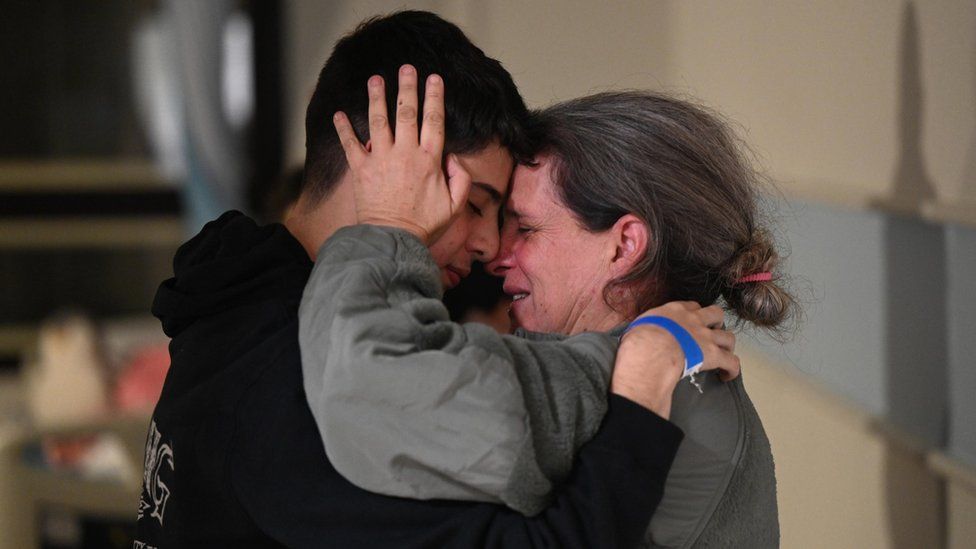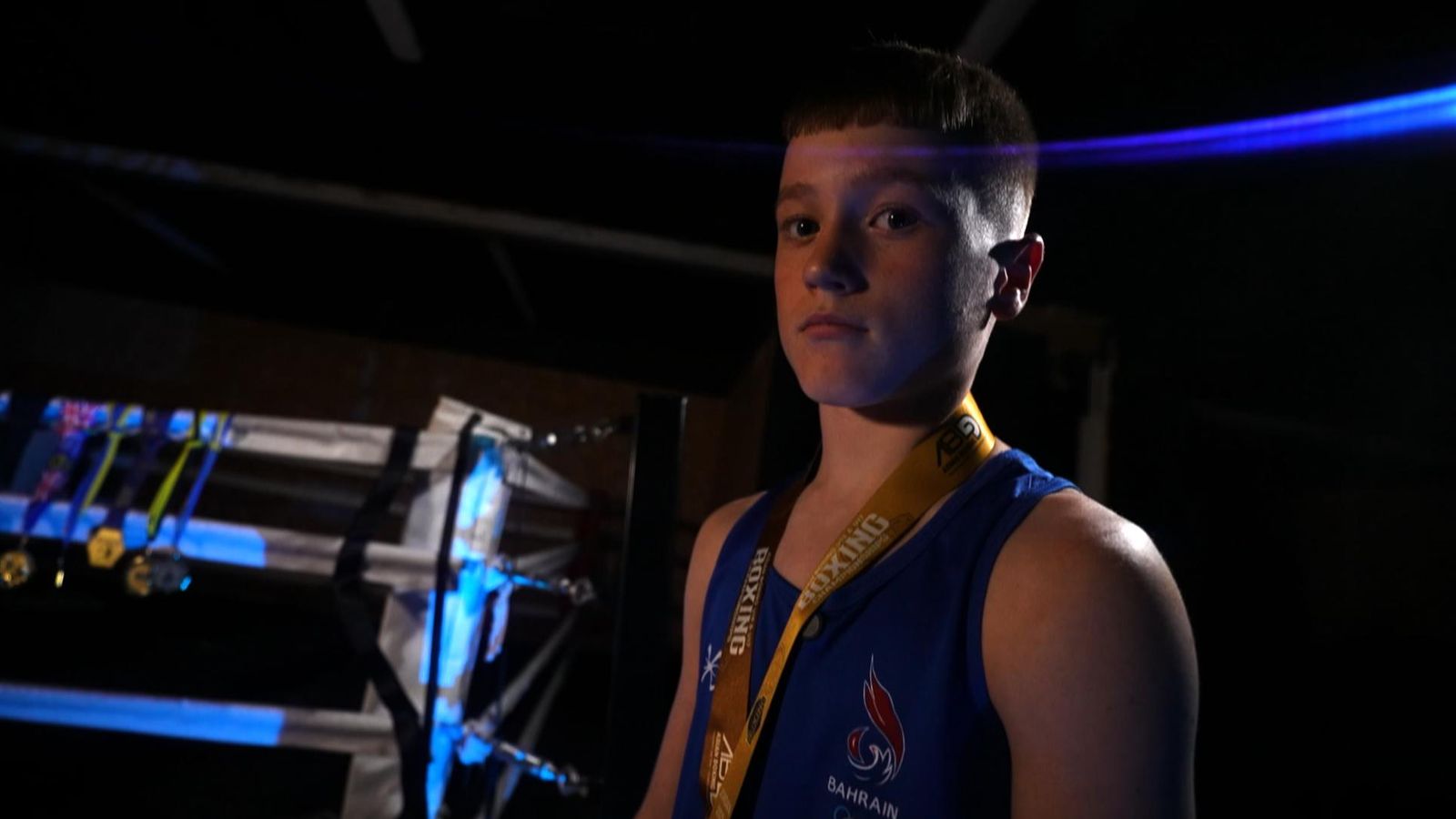Freed Hamas captives tell of fear, squalor and hunger
Bare benches for beds in "suffocating", airless rooms. Little to no food. A child captive forced by Hamas to watch the carnage of 7 October on video.

Stories emerging from those freed from Gaza - mostly through their relatives - paint a picture of weeks spent in squalor, uncertainty and fear.
One hostage, Ruti Munder, 78, said she learned her son had been killed in Israel by listening to a radio used by guards.
Deborah Cohen claimed her 12-year-old nephew was made to watch videos of the Hamas rampage through southern Israel.
More than 60 of the estimated 240 people taken hostage by Hamas have now been freed under the Israel-Hamas truce deal.
Few have spoken directly about their experiences, but those who have - either themselves or through their families - relay a captivity that has left a host of emotional and physical scars.
In an interview with French television channel BFM, Ms Cohen described the conditions that her nephew Eitan Yahalomi, 12, endured throughout his 52 days as a hostage.
"When he arrived in Gaza, all of the residents, all of them, beat him up. He's a 12-year-old child," she said, adding that any child who cried was "threatened with rifles".
Ms Cohen said that Eitan had told her that "Hamas forced him to watch horror videos" of the 7 October attacks, when at least 1,200 people were killed.
"Yesterday (when Eitan was released) we were so happy," Deborah Cohen told BFMTV, "but now that I know this I worry. It's unimaginable. I don't know who could do such a thing."
"I wanted to believe that Eitan would be well treated. Apparently not. Those people are monsters."
The Times of Israel reported that Eitan's father, Ohad, was shot and wounded in a gun battle and remains in captivity in Gaza.
Other hostages have told relatives of being kept in crowded underground hallways and rooms with little electricity.
They were strictly controlled by their guards - denied pens in case they tried to communicate covertly among themselves.
Ruti Munder, 78, was freed on Friday along with her daughter Keren, 54, and nine-year-old grandson Ohad Munder-Zichri.
She said her captors had forced her group to sleep on benches without mattresses, in a "suffocating" room with little fresh air.
She was fortunate to be given a sheet - many others including young girls and boys were not.
"We covered ourselves with a sheet. The boys slept under the benches, on the ground, because we wanted them next to us," she told Israel's Channel 13.
It also appears that Hamas split families up - with many left in the dark about what had happened to their relatives on 7 October.
In video footage released by Mrs Munder's family, a relative is heard saying that her husband Avraham, also aged 78, was still being held hostage. Keren Munder replies: "So he wasn't murdered."
Mrs Munder then describes how she had learned from listening to the radio in captivity that her son, Roy, had been killed by Hamas in Nir Oz kibbutz.
Food varied. The 78-year-old said she received chicken and rice at first, with tea twice a day.
"We were OK," she said, but added that what they were given soon changed when "the economic situation was not good, and people were hungry".
Another relative, Merav Raviv, described how Mrs Munder and her daughter had each lost around 7kg (15lb).
Others have spoken of a meagre, dwindling diet of canned hummus, pitta bread and salty cheese - towards the end some hostages said they received just two slices of bread a day.
Those involved in looking after freed children say that many are suffering effects of psychological strain.
A resident of Kibbutz Be'eri said two released girls were still speaking in whispers, after weeks of being told to keep their voices down by their captors.
Thomas Hand, the father of nine-year-old Irish-Israeli Emily Hand, who was released on Sunday, said that his daughter now cries herself to sleep at night.
"She's coming out slowly, little by little," he told US media.
"The most shocking, disturbing part of meeting her was that she was just whispering, you couldn't hear her. I had to put my ear on her lips," he said.
"She'd been conditioned not to make any noise."
Elma Avraham, 84, was released on Sunday and transferred immediately by helicopter to a hospital in Beersheba in a "serious and life-threatening" condition.
Her daughter Tali Amano said that Hamas had held her mother, who already suffered several serious medical conditions, in terrible conditions.
Vital daily medications were denied for some 50 days, she said, adding: "My mother arrived hours before we would have lost her."
Hagai Levine, the head of medical affairs from the Hostages and Missing Families Forum, said that Mrs Avraham had been held "for 52 days ... in conditions that no human being should be kept in... without human dignity".
Yocheved Lifschitz, an 85-year-old hostage who was released weeks ago on 23 October, said at the time she had been through hell.
The grandmother and peace activist was kidnapped by Hamas on motorbikes, beaten with sticks and taken into a "spider's web" of tunnels under Gaza.
But she also describes hostages as being "treated well", with clean conditions and mattresses on the floor for them to sleep on.
"They made sure we wouldn't get sick, and we had a doctor with us every two or three days," she said.
-bbc






